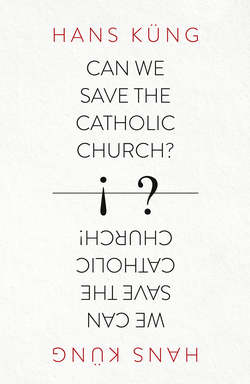Читать книгу Can We Save the Catholic Church? - Hans Kung - Страница 19
The Fifth Fever Attack: The Flurry of Excitement about Condoms
ОглавлениеA long interview given by Benedict XVI to his favourite German reporter, Peter Seewald, and published as a book under the title Light of the World, caused a considerable stir. In the interview, the pope admitted, for the first time, that in the battle against AIDS the use of condoms might be permissible under certain circumstances. Of course, a pope can make his opinion known in interviews, but whether such a delicate and intimate issue should be treated in this informal manner is debatable. Initially it was unclear how authoritative such an interview was. Its prior publication in Osservatore Romano (even before the press release embargo date had expired!) was clearly part of a carefully directed, widespread publicity campaign, and the result was international media frenzy. A heated discussion immediately erupted as to whether this pronouncement by the pope represented a policy change or not. In reality, it was both. After Pope Benedict, during his trip to Africa, had branded the use of condoms as unconditionally immoral, he appeared, to all intents and purposes, to have changed his mind, at least with regard to male homosexuals. Nevertheless, that effectively amounted to a belated admission that it was no longer possible to uphold the previously rigid doctrine on artificial techniques of birth control. The pope knew that even some otherwise conservative Catholics, including bishops and theologians, and, even more importantly, certain Church organizations involved in providing aid to the developing world, rejected the Church’s rigid prohibition of condoms, and that the irrational Vatican policy was making the Church look ridiculous all over the world. Thus, the pope’s statement was mainly a tactical manoeuvre and did not represent a fundamental change. Limiting the ethical concession to male prostitutes constituted an affront to all married couples and particularly to women, who are the principal victims of the spread of AIDS in Africa.
A truly fundamental reversal of the Church’s previously held position would have occurred if Benedict had not limited his casuistic response to male prostitutes but instead had given a fundamental answer to the question being asked by millions of heterosexual married couples, namely whether the Roman Magisterium no longer considers every form of ‘artificial’ birth control intrinsically evil. There is nothing on this topic in the Bible. In reality, the idea derives from a false understanding of natural law, assuming that every act of sexual intercourse must always be directed towards propagating the species. Clearly, the then pope intended to continue to adhere to the position set forth in Paul VI’s controversial encyclical Humanae vitae. And so he got caught in the infallibility trap, a trap that needs to be discussed openly and honestly. The provisional result of this obfuscation was formulated by the International Herald Tribune in an article under the headline ‘Confusion, not clarity from Pope’ (23 November 2010). Paradoxically, this confusion was confirmed four weeks later by the Congregation for the Doctrine of the Faith itself in a statement that attempted to pour oil on the troubled waters stirred up by its former prefect by publishing, just before Christmas, a memorandum in six languages entitled ‘On the Trivialization of Sexuality’. According to the memorandum, Benedict’s comment on the permissibility of using condoms was in no way intended to be understood as implying the principle (otherwise well-established in ethics) that a lesser evil should be balanced against a greater one. What a pity.
Perhaps an end to reports of such fever attacks might indicate a drop in the severity of the illness affecting the Church; unfortunately, however, it looks as though there will be no end to such reports. How then should we react?
